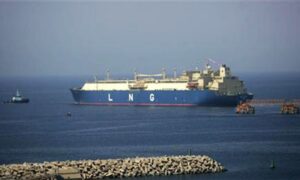Newspaper Article 23/02/2016
Pakistan and Qatar have signed a worth $16 billion deal of Liquefied Natural Gas (LNG) for a period of 15 years. Pakistan has been suffering through a severe energy crisis and the import of LNG from Qatar would be a positive step to address the issue. The deal has large prospects for the energy sector as Pakistan would be able to meet its energy requirements. 3.75 million tons of LNG would be imported annually on a government-to-government basis, at comparative rates. The price agreed for each LNG cargo discharged per month is 13.37pc of Brent value which is cheaper than the gas to be imported through pipelines projects including Iran-Pakistan (IP) and Turkmenistan-Afghanistan-Pakistan-India (TAPI) projects.

In the first phase, from 2016 to first quarter of 2017, the annual contract LNG quantity would be prorate of 2.25m tons which would be increased to 3.75m tons per annum beginning second quarter of 2017. The long-term agreement would also provide for annual upward and downward flexibilities of up to three LNG cargoes against the two earlier agreed upon per contract year. The LNG deal would also provide the LNG to Pakistan on 15-day defer payment against the earlier settlement of defer payment for 10 days. According to the agreement, the cost of imported gas is estimated to be $4.78 per mmbtu, lower than the Qatar’s current rate of $5.35 mmbtu and the cheapest in its kind in South Asia.
Almost four years ago, Pakistan and Qatar had first inked a memorandum of understanding (MoU) for importing LNG. In July 2013, the Economic Coordination Committee (ECC) of federal cabinet had started negotiations with Qatar for the gas import. The cabinet in 2013 had given the approval for the LNG import deal. Subsequently, an agreement relating to energy sector cooperation was signed between the two governments. In August 2014, the ECC formed the price negotiation committee (PNC) comprising representatives of the petroleum, finance, water and power, Sui Northern Gas Pipelines Ltd. (SNGPL), Sui Southern Gas Company Ltd. (SSGCL), PSO and Inter State Gas Systems Limited (ISGSL) to negotiate the price with Qatar. The negotiating committee comprising members of the two countries undertook 12 rounds before agreeing at the price. After the long negotiating process, both the countries have finally signed the LNG deal this year.
Minister of Petroleum Shahid Khaqan Abbasi has called the deal as a ‘game changer’ for Pakistan as it would save the country $1 billion annually. The world community has praised the deal being the most cost effective deal for LNG globally as Pakistan would import fuel from Qatar for a long period i.e. from 2016 till 2032. As the supply-demand gap in Pakistan stands at 2-4 billion cubic feet per day (bcfd) approximately, the import would help meet 20-25 per cent of its energy needs. The Qatar LNG deal would have positive impact on the power generation sector, agricultural sector and industrial sector. Besides facilitating the CNG sector, the LNG would help in pollution reduction and in the revival of fertilizer plants and non-operational electricity generating units of 2,000 megawatts. The LNG deal would also mitigate the electricity and gas shortage problems faced by domestic consumers. Hence, the LNG deal would help in the growth of the economy of Pakistan.
The LNG deal has bolstered the Pakistan-Qatar diplomatic and economic ties. The Emir of Qatar visited Pakistan in March 2015 and in less than a year PM Nawaz Sharif has visited Doha which reflects that maintaining good and friendly relations with Qatar are important for Pakistan. Qatar has been hosting 115,000 Pakistanis and therefore Pakistan through its manpower has been contributing towards the development and prosperity of Qatar. In the Doha meeting, both the leaders exchanged views on regional and international issues of mutual interests. PM Nawaz has called upon the Qatar Investment Authority to explore and invest in the oil, gas and power sector of Pakistan. Apart from LNG deal, three other agreements were also signed in the field of radio and television, health and academic research. In short, Pakistan-Qatar bilateral relations would be strengthened not only through this long awaited LNG deal but also through enhanced cooperation in the fields of energy, trade, investment and defence.
The article was carried by Pakistan Observer, February 20, 2016.
Disclaimer: Views expressed are of the writer and are not necessarily reflective of IPRI policy
